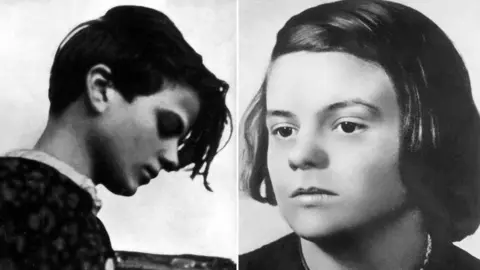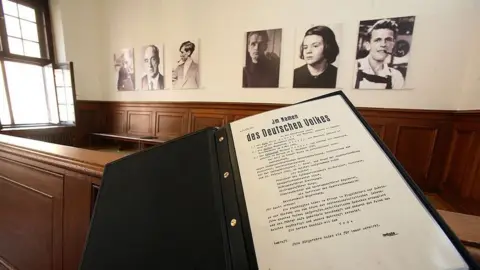Sophie Scholl: Student who resisted Hitler and inspires Germany
 Getty Images
Getty ImagesHer name is not widely known outside Germany, but Sophie Scholl is an iconic figure in her native country and her story is extraordinary.
This weekend many will commemorate the 100th anniversary of the birth of a young woman who famously stood up to Adolf Hitler and paid for it with her life.
Her resistance is retold countless times in books, films and plays. And it continues to inspire people today.
Sophie Scholl was born in 1921 into a country in turmoil. But her childhood was secure and comfortable.
Her father was the mayor of the south-western town of Forchtenberg (though the family would later move to Ulm) and Sophie, along with her five brothers and sisters, was brought up in a Lutheran household in which Christian values mattered.
But by the time she reached her teens, Adolf Hitler was running the country.
'Don't tell me it's for the Fatherland'
At first Sophie and her older brother Hans supported the National Socialist Party. Like many other youngsters, he joined the party's Hitler Youth movement and she its sister organisation, the League of German Girls.
 Getty Images
Getty ImagesHer father, an ardent critic of Hitler, was by all accounts horrified by their initial enthusiasm. And the influence of family and friends gradually began to take effect.
The siblings, ultimately unable to reconcile their own liberal leanings with the politics of the Third Reich, and noticing the way in which Jewish acquaintances and artists were treated, began to view the regime through increasingly critical eyes.
And by the time Hitler invaded Poland that had hardened into opposition.
As young German men were sent off to fight, Sophie wrote, rather bitterly, to her boyfriend Fritz Hartnagel, who was also a soldier: "I can't understand how some people continuously risk other people's lives. I will never understand it and I think it's terrible. Don't tell me it's for the Fatherland."
This recently launched Instagram account recreating Sophie Scholl's story with modern actors has attracted half a million followers.
Allow Instagram content?

Sophie followed her brother Hans to Munich university, where he was studying medicine, and the siblings socialised with the same group of friends, said to have been united by their mutual appreciation for art, culture and philosophy. Sophie, who studied the subject along with biology, is said to have liked to dance and play the piano, and she was a talented painter.
But these were violent times. Some of the students had seen active service. They were living in a dictatorship, and they were determined to resist.
'We won't be silenced'
There were just six members of the "White Rose" group, originally founded by Sophie's brother Hans Scholl and his friend Alexander Schmorell. They were joined by Sophie, Christoph Probst and Willi Graf, and by one of their professors, Kurt Huber.
 kpa/ United Archives
kpa/ United ArchivesSupported by a network of friends and supporters, they printed and distributed leaflets, encouraging citizens to resist the Nazi regime, denouncing the murder of Jewish people and demanding an end to the war.
"We won't be silenced," read one, "we are your bad conscience, the White Rose won't leave you in peace."
The group produced their sixth pamphlet at the beginning of 1943.
"The German name is forever damaged if the German youth doesn't finally rise up, avenge and atone at the same time, crush their tormentors and found a new spiritual Europe."
It was to be their last.
 EPA
EPAOn 18 February 1943 Hans and Sophie were handing out the leaflets at the university.
It's not clear why Sophie climbed to the top-floor landing that overlooked the airy atrium of the university's main building and flung a stack of pamphlets over the balustrade. Most assume she wanted as many students as possible to see them.
But, as the papers fluttered down to the ground, she was watched by a caretaker who betrayed her to the Gestapo - the secret police.
She and her brother were interrogated and, after a show trial, sentenced to death. They refused to betray the rest of the group but the authorities tracked them down anyway. Within a few months the friends had all been executed.
 Getty Images
Getty ImagesOn the morning that she went to the guillotine, Sophie, aged 21, said:
"Such a fine, sunny day, and I have to go... What does my death matter, if through us, thousands of people are awakened and stirred to action?"
Those words, her bravery, are still honoured in Germany today, where schools and roads bear her name and that of her brother. It's the source of regret for some that the other members of the White Rose group are rather less prominently commemorated.
 Getty Images
Getty ImagesAnd her name is easily exploited.
There was outrage when, a few years ago, the far-right party AfD issued a slogan "Sophie Scholl would have voted AfD". At a rally against Covid measures in Hanover last November, a young woman jumped onto the stage and compared herself to Sophie Scholl.
But, on what would have been her 100th birthday, the German mint is issuing a commemorative coin, there'll be dedicated church services, and there's a new Instagram channel dedicated to her life.
Many here will quietly reflect on the life of a young woman whose courage and conviction still stir hearts and minds today.

